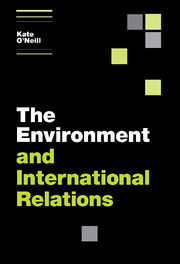Book contents
- Frontmatter
- Contents
- Preface
- Acknowledgements
- List of commonly used abbreviations
- 1 Introduction: The environment and international relations
- 2 International environmental problems
- 3 Actors in international environmental politics
- 4 State-led global environmental governance: International cooperation and regime formation
- 5 The impacts and effectiveness of environmental treaty regimes
- 6 Global economic governance and the environment
- 7 Non-state global environmental governance
- 8 Conclusions: The environment and international relations in the twenty-first century
- References
- Index
- References
8 - Conclusions: The environment and international relations in the twenty-first century
Published online by Cambridge University Press: 05 June 2012
- Frontmatter
- Contents
- Preface
- Acknowledgements
- List of commonly used abbreviations
- 1 Introduction: The environment and international relations
- 2 International environmental problems
- 3 Actors in international environmental politics
- 4 State-led global environmental governance: International cooperation and regime formation
- 5 The impacts and effectiveness of environmental treaty regimes
- 6 Global economic governance and the environment
- 7 Non-state global environmental governance
- 8 Conclusions: The environment and international relations in the twenty-first century
- References
- Index
- References
Summary
In December 2007, delegates from 191 countries met in Bali, Indonesia, at the Thirteenth Conference of the Parties to the UN Framework Convention on Climate Change to draw up a road map towards a new agreement to replace the Kyoto Protocol after it expires in 2012. With climate change high on national and international agendas in the months leading up to Bali, ideas and energy flowed around the shape of “Kyoto 2.0” as a potentially new model of global environmental governance. Would this be an opportunity to begin moving beyond an explicitly state-centric model of global environmental governance, and the inevitable compromises and disappointments that creating a consensus agreement among nearly 200 governments requires?
Worldwide, initiatives to combat climate change and greenhouse gas emissions had proliferated and diversified. From guides to individual consumer behavior to emerging carbon markets and biofuels development to local government-led efforts to combat climate change, climate change has engaged civil society actors, entrepreneurs and investors, corporate actors, and politicians across national borders and traditional scales of governance. Although at least one critical climate laggard–Australia – ratified Kyoto in late 2007, some argued that the rigid, diplomacy-based model should be abandoned, or seriously restructured, to better fit the complexities of the problem, the diversity of viable options to address it, and the full community of stakeholders in climate debates (Prins and Rayner 2007; Amen et al. 2008).
- Type
- Chapter
- Information
- The Environment and International Relations , pp. 197 - 211Publisher: Cambridge University PressPrint publication year: 2009



